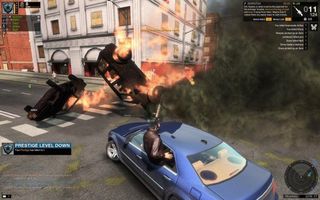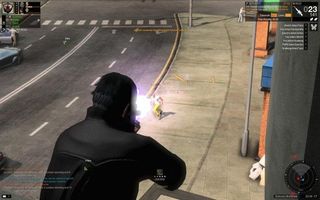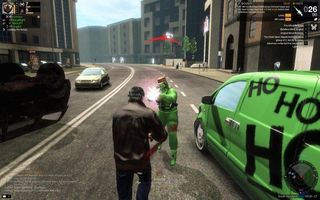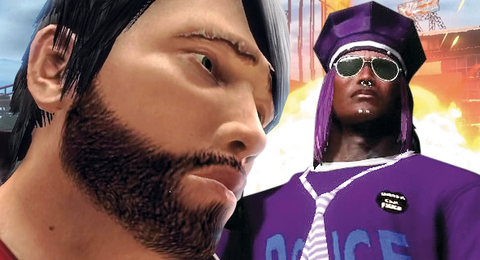Our Verdict
Confused and weightless, APB doesnt satisfy on any front: the shooting, driving, story and objectives are all sub-par.
PC Gamer's got your back
There are moments in APB where I found my heart pounding out of my chest, beating faster than my assault rifle could empty ammunition. APB's San Paro is a online city where the criminals fight the police on the streets, both sides player-controlled. When it works, it's incredibly exciting. The problem is, it doesn't work.

Fundamentally, it's a game about shooting and driving. Players of both sides must make their way to a point on the map, mowing down resistance between them and their objectives.
Taking a job creates an objective marker at a remote location. Getting there is simple: the streets are full of easily nickable cars. Each player also has their own private garage of vehicles equippable at specified parking lots around the city.
Thus, I had 30 seconds of driving joy at the start of every mission. I'd call my PC Gamer-emblazoned saloon into existence, climb in, gun the engine and whoosh it up the exit ramp, firing the siren and pumping the horn. Then I'd finally dare to turn left, skid into a row of idiot pedestrians and flip my beautiful ride onto its back.
Floaty, unresponsive and with an odd mixture of under- then severe oversteer, APB 's cars feel like petulant automotive teenagers, never willing to do what you ask. In a game where you're expected to drive fast after other cars driving fast – and you are expected to do this a lot – the handling model is wilfully sadistic, forcing you to plan turns a good few hundred metres before intersections.

Compounding the teeth-gnashing frustration is the city's approach to scenery. To define that approach in one word, I came up with 'incoherent.' Big wire fences, you can drive through. Small wire fences? No. Postboxes, streetlights, bollards? All fair game for smashing. Wooden cable-spools? Bolted to the floor. It makes sense, on a planet where nothing makes sense.
Back on a typical mission, and after much (very much) reversing, car-switching, and swearing to dark gods, I'd reach my destination. APB works best in groups, where you work together to complete the staged objectives. On solo missions, I was rarely challenged, free to go to my objective and defuse a bomb (press F on it), clean graffiti (press F on it), or secure evidence (press F on it). Join a bigger and more lethal group, and you're more likely to face resistance. While players normally can't shoot each other up, the server can assign a rival team the mission of 'stop team x completing their mission', and that's where APB gets more interesting.

With a truck full of fighters, I circled a city-block where a car waited that we had to search, aware my crew were the targets of a gang of four crims. Spotting and offing these party crashers gave us a few seconds to complete our task (guess what I pressed?), then we were tearing off to the next job before our opponents got their shit together again.
Missions rarely get more complex. In my time as an Enforcer, every crime was solved by pressing F on a thing. On my own, I got handed a surfeit of four-stage missions. Ostensibly I had to search for 'evidence', or photograph a 'crime scene', but APB 's missions are more brazenly cheap than any 'kill ten boars' quest. Drive, get out, press F. Drive further, get out, press F some more. It feels artificial, a placeholder plonked on top of an excellent concept Realtime Worlds didn't quite know what to do with.
Group tactics
Playing with others certainly eases the tedium of the objectives. Getting into a group proved easy: I'd join a server, elect to 'look for a group', and be playing along with others in minutes. It's easy, too, to become another player's opponent: a simple matter of accepting a randomly generated job. It's an exhilarating exercise when it's on your terms.
But it rarely is. Coming up against a well-drilled posse is fun; facing off against a group who – thanks to the objective point system – know exactly where you are at all times is just infuriating. Too many jobs end with an extended, dragged-out stalemate: I lost count of the groups I faced who'd hare toward a high point on the map and hole up, guns trained down to massacre anyone who dared come close. There's no counter to tactics like this, and it kills any desire to keep playing. I ducked in with a couple of new players, repeatedly getting to the penultimate mission stages before being gunned down by terrifyingly efficient death squads in unassailable hidey holes. It's an approach very much at odds with the typical MMO philosophy of constant reward.

Frustration is built into the game at all levels. Eventually getting the jump on one of the guys terrorising my poor newbies, I unloaded three-shot-burst after three-shot-burst into his back. Flipping round, he fired back and killed me. He had a better gun, so he won. Realtime Worlds may deserve some credit for taking MMO combat away from behind-the-scenes dice rolls, but this is no level playing field: someone who has played the game for longer will have a better weapon and a more powerful character than a new player. The system is supposed to compensate, matching smaller groups of the best versus big gaggles of initiates, but inevitably, the most experienced and best equipped players always win.
Shooting is perfunctory: loosing a clip of high-velocity ammo into another player's face has no kinetic feedback, leaving firefights spectacularly unsatisfying. I also had to fight against my gamer conditioning and the urge to aim for heads. In APB , the lack of locational damage means a bullet in the finger has the same effect as one in the brain-stem. Realtime Worlds argue this is to tempt the casual player and reduce the propensity for online snipers. They've certainly done one of the two, with the draw distance (even with the setting on 'max') at under 100 feet, but the decision to remove headshots feels more like an engine constraint. I had big trouble hitting certain jiggling baddies, my dead-on shots somehow slamming into the wall behind my target. APB 's gunplay is fundamentally unsatisfying: riddling a foe with buckshot should see him at least flinch, not steady his aim and twat you with a stream of assault rifle fire. When so much of the game relies on protracted battles, missions are greeted with creeping dread, not anticipation.
Hull on earth
Nor does the city take your mind off the drudgery. Uniformly dreary, San Paro is functional at best; at worst, it's boring: featureless slabs of concrete rising to form simple paths through leaden architecture.

This is completely at odds with the game's powerful customisation system for designing characters, clothes and paint-jobs. Players have already crafted riotously colourful designs to replace the game's default backwards-baseball-capped frat dick. These specks of over the top brightness stand out like gun-toting sore thumb people against the city's bland canvas. Literally, since after they pop into reality it takes a good while for the game's engine to load the textures. Big groups of players stuck with the default template while this happens tend to look like the crowd at a Limp Bizkit reunion gig.
APB is a game hamstrung by ideas, not least the scoring system, which includes a basic rating, 'prestige' and 'notoriety'. Earn the top rank and you're highlighted for all and sundry to murder for a bounty. This short-term celebrity is fascinating in a design document; in the game, it means the players closest to the high ranker take him out in seconds.
Each extra layer of ideas has been slapped on before the previous concept had time to solidify. We're left with a game that, were you to dig into its foundations, would show structural problems at every strata.
The heart-thudding thrills, I came to realise, came about not because of APB 's world, but despite it. Cramming people into a game-city and forcing them to scrap will always provide a frisson of tension and excitement, but every second I spent savouring those feelings I also spent cursing APB 's mechanics. In its current form, Realtime Worlds' take on the MMO is draining: beyond the end of my time playing the extended beta, and the finished game, I've had no desire to play the game further. For a persistent online game, that's not a good sign.
Confused and weightless, APB doesnt satisfy on any front: the shooting, driving, story and objectives are all sub-par.

